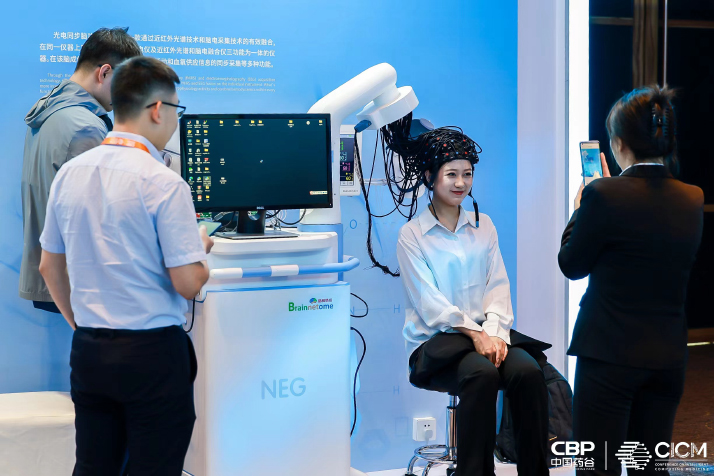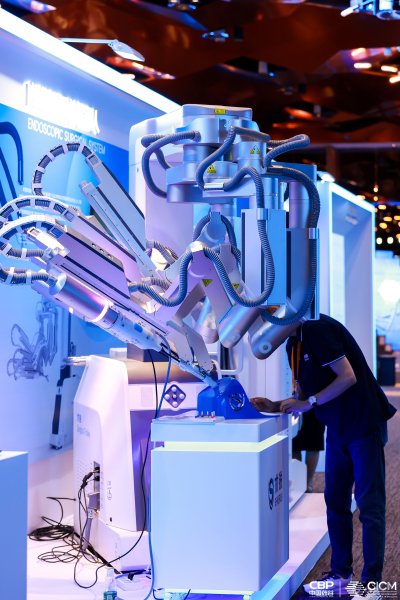| China |
| Computational medicine plays a key role in building a healthy China | |
|
|
|
Health is fundamental to personal development and societal progress. On September 22 and 23, Beijing's Daxing District hosted a conference on Intelligent Computing Medicine. Experts and scholars from around the world congregated with the aim of advancing and managing the application of science and technology in the medical field, and elevating human health to new heights.
Computational medicine, an interdisciplinary field, applies mathematics, engineering, and computer science to the understanding of the mechanisms of human diseases. Daxing District is dedicated to fostering a life science and health industry cluster. Daxing Biomedical Industry Base, also known as the China Biomedicine Park, has become a pivotal engine driving the development of Beijing's healthcare and pharmaceutical industry.  An attendee of the Conference on Intelligent Computing Medicine experiences the fNIRS-EEG, a new type of instrument developed for brain function detection (COURTESY PHOTO)
Smart health The health of the people serves as a significant indicator of national prosperity and strength, and the Chinese Government has consistently emphasized the construction of a healthy China. Since the founding of the People's Republic of China in 1949, significant achievements have been made in the healthcare sector, leading to continual improvements in people's health and physical wellbeing. According to the Statistical Bulletin on the Development of China's Health and Healthcare in 2021, released by the National Health Commission in 2022, China's average life expectancy reached 78.2 years in 2021, while infant mortality and maternal mortality rates dropped to 5 per 1,000 and 16.1 per 100,000, respectively. These three major health indicators are all among the top tier of middle-to-high income nations. However, China still faces challenges in areas such as chronic disease prevention and control, responding to major public health emergencies, and medical innovation. Furthermore, with the growing awareness of health, a high-quality, healthy lifestyle has become the pursuit of many Chinese people. Computational medicine is emerging as a key enabler for future development and a crucial step toward realizing a healthy China. Wu Hao, deputy head of Daxing District, emphasized that data has become the core element of the healthcare and pharmaceutical industry, driving the industry toward smart medicine focused on data, computation, and artificial intelligence (AI). This shift deepens our understanding of the mechanisms of human diseases, enhances disease prediction, clinical diagnosis, and health maintenance; and accelerates the development of new drugs and medical devices. One of the most prominent achievements of computational medicine currently lies in drug development. Nobel laureate in physics, George Fitzgerald Smoot, introduced at the conference that drug development is a lengthy and arduous process, involving the screening of thousands of molecular compounds and multiple phases of clinical trials. AI technology can help overcome many of the current challenges in drug development. High computing power can optimize drug molecule design through data analysis and modeling. Additionally, deep learning algorithms can enhance the accuracy and efficiency of toxicity analysis. Many AI companies are now involved in drug development, from identifying and validating drug targets to optimizing them, marking a significant trend in the biopharmaceutical industry. With the widespread application of AI and automation technologies, drug development has undergone a profound transformation. Smart medicine has significantly enhanced the quality and efficiency of healthcare services. AI has upgraded the entire healthcare process, from diagnosis to treatment. Chen Kaixian, an academician of the Chinese Academy of Sciences, told Beijing Review, "In the past, doctors' judgment of a patient's condition relied on their experience, skills, and expertise, sometimes leading to misjudgments. However, with the application of AI technology, medical diagnosis can be significantly improved, leading to higher efficiency and reduced costs." He also added that smart medicine can provide individuals with refined, personalized, and enriched healthcare services and resources, effectively addressing the contradiction between the overall shortage of healthcare services and the continuous growth in demand, ultimately providing people with a higher quality of life. The digitization of healthcare, coupled with technological innovation and information integration, is the inevitable path toward advancing healthy China and raising the health standards of the people. Man plus machine The foundation of intelligent computing medicine is data, which is a strategic and fundamental resource for a country. Harnessing the value of data in the healthcare field requires rational use and management. Zhan Qimin, Director of the National Institute of Health Data Science at Peking University, emphasized, "Medical data involves issues of personal privacy and ethics. We must govern data scientifically. The rapid development of medical technology can lead to significant issues if regulatory measures cannot keep up." In 2016, the outline for the Healthy China 2030 initiative, jointly issued by the Communist Party of China Central Committee and the State Council, highlighted the need to enhance the construction of the healthcare and medical big data application system. The outline emphasized the removal of data barriers, strengthening the development of related regulations and standards for healthcare and medical big data, with a keen focus on content security, data security, and technological security. Furthermore, it underscored the importance of reinforcing the security measures for healthcare and medical data and protecting patient privacy. The progress of computational medicine is inseparable from technological development and innovation. Piero Scaruffi, founder of Silicon Valley Artificial Intelligence Research Institute told Beijing Review, "China has been very good at catching up with the United States. What I want to see from China in AI is that China can invent something we don't have, which other countries have to catch up with." Innovation needs to be bolstered by basic research and technology transfer. Using drug development as an example, Chen stated that China is currently in a relatively advanced position in the first-tier countries, alongside Japan and other developed countries. However, there is room for improvement in China's basic research and the transformation of research into practical applications. "This requires a new layout of the entire innovation system in drug development. Our universities and research institutions need to focus more on strategic and promising research. Companies should also actively participate in and pay attention to the translation of technology research into applications." "It's me with AI that is better than me without AI. I think the important thing to realize is that man, woman, machine—the three together are very powerful," Nobel laureate in chemistry Michael Levitt told Beijing Review. The combination of doctors and AI is a way to improve work efficiency and a model for future development. Computational medicine will provide people with higher-quality and more inclusive medical services, ushering humanity into an era of information and intelligence in healthcare.  A visitor experiences a single-port laparoscopic surgical robot during the Conference on Intelligent Computing Medicine held in Daxing District of Beijing on September 22 (COURTESY PHOTO)
Copyedited by G.P. Wilson Comments to wangruohan@cicgamericas.com |
|
||||||||||||||||||||||||||||
|